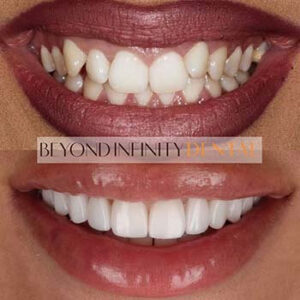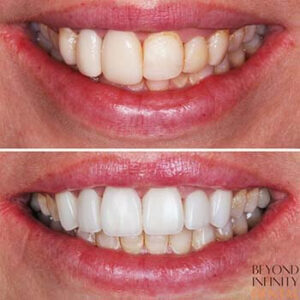Crowns vs veneers produce similar cosmetic dental results, but what’s the difference and which procedure is right for you? Read on below to find out more.
If you’re looking to hide damage to your teeth, you may face the dilemma of crowns or veneers. When deciding which restoration is the most suitable for you, it may depend on the amount of tooth structure required, but if you’re undecided between veneers vs crowns – we can help.
Not quite sure of the difference? Well, briefly, dental veneers cover just the front surface of teeth, whereas dental crowns cover the entire visible surface. Both procedures significantly improve the smile’s overall appearance and, when done well, can be genuinely life-changing.
So let’s jump into today’s post and take a closer look at the two procedures, starting with crowns.
What are dental crowns?
A dental crown, often referred to as a cap, is a hollow tooth-shaped prosthetic around 2mm thick that encases a tooth. Typically, a dentist uses dental crowns to strengthen and support weak or damaged teeth to restore form and functionality, whiten heavily stained teeth, or correct misshapen teeth to improve their appearance.
Why dental crowns?
 Crowns are durable, making them an ideal choice if your teeth are severely worn down, and you’re prone to teeth grinding. They can be shade-matched and shaped to your surrounding teeth for a natural finish.
Crowns are durable, making them an ideal choice if your teeth are severely worn down, and you’re prone to teeth grinding. They can be shade-matched and shaped to your surrounding teeth for a natural finish.
Furthermore, when deciding between crowns vs veneers, it helps to be aware that your dentist can use crowns to improve the smile’s appearance, even when there isn’t sufficient tooth structure remaining to place veneers – and still create your dream smile.
Types of dental crowns
Permanent crowns come in various materials, including gold, stainless steel, platinum, ceramic or porcelain, and even porcelain-fused-to-metal (PFM) A patient may also opt for a resin dental crown, in some cases, but they are not as long-lasting. Temporary crowns, on the other hand, are usually made from acrylic.
How does the process work?
Getting a crown usually requires two visits to the dentist. During the first appointment, the dentist will take an x-ray and 3D images of your teeth and the bone surrounding them to assess their health. He will administer a local anaesthetic to numb your mouth and ease any discomfort as he gently files down the top and sides of the affected tooth so it fits perfectly within the crown. The dentist also takes an impression of the tooth to prepare a mould from which the dental lab will create your custom crown. You will also be provided with a temporary crown to protect the prepared tooth while you wait for your permanent crown.
At the second dental visit, the dentist will check the colour and fit of your permanent crown and then cement it into place.
So now you more about crowns, let’s take a closer look at veneers.
What are porcelain veneers for?
Are your teeth an irregular shape or badly discoloured? Perhaps you have fine cracks you’d like to conceal. If so, porcelain dental veneers could be the perfect cosmetic treatment for you. Whether your teeth are slightly crooked, gapped or protruding, dental veneers can restore your confidence in an instant. The purpose of veneers is similar to that of crowns. But comparing crowns vs veneers, the procedure is quite different. Unlike in dental crowns, very little tooth enamel is removed when preparing the teeth for veneers.
So, what do dental veneers look like?
When comparing veneers to crowns, we describe them as shells or covers for the front surface of the teeth. Because the dentist applies veneers to the front surface of a tooth, they work best for teeth that are uneven, slightly misshapen, chipped or deeply stained in such a way that whitening treatments cannot rectify the problem. Veneers cannot structurally replace a whole tooth, although they are highly durable and can last up to 15 years before replacement.
Veneers vs crowns – the procedure
Porcelain is a popular option for dental veneers, although many dentists also offer composite veneers. Porcelain is a sturdy material that can be shaped and coloured in great detail to resemble a natural tooth.

Furthermore, a person can choose how many veneers to have and, when comparing crowns vs veneers, the process is relatively straightforward.
Following an in-depth consultation, only two dental appointments are necessary. The first visit is for the dentist to make an impression of your natural teeth and determine where the dental veneers will fit and how they will look.
In most cases, the dentist removes a thin sliver of enamel from your teeth to ensure the veneers fit flush within the smile and provides you with temporary veneers.
During the second appointment, usually, a couple of weeks later, the permanent veneers are bonded to your teeth, and you can walk out with a brand new smile on your face.
Veneers vs crowns – how they differ
Dental veneers and dental crowns are two of the most popular options for people wishing to change the appearance of their teeth. Not only are they effective at improving the appearance of the teeth, but they also help reduce any discomfort when eating and improve speech.
A porcelain veneer only covers the front surface of the tooth and is wafer-thin. When comparing veneers vs crowns, dental veneers ensure a slight adjustment to the natural teeth instead of a significant reduction in tooth enamel.
So in the crowns vs veneers debate, which is best?
When choosing between the two procedures, it depends on the condition of your teeth and the results you are hoping to achieve.
Generally speaking, dentists recommend dental crowns for severely worn, heavily filled teeth or following a root canal. Dental veneers are for those people wishing to make cosmetic improvements and is a less invasive procedure.
If you’re weighing up your options of crowns vs veneers, why not come and speak with the friendly, experienced dentists at Beyond Infinity Dental. We’ll be happy to discuss both procedures in more detail to help you make an informed decision.
Call us today on (02) 8806 3799 or use our online booking service. We look forward to meeting you.










